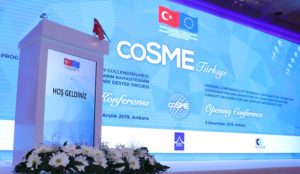
Strengthening the Internal Market
Project is comprised of six components, as follows: Component 1: Improving the strategic, legislative and institutional framework in area of Free Movement of Goods Component 2: Improving the strategic, legislative and institutional framework in area of Free Movement of Services. Component 3: Improving the legislative alignment with the

Technical Assistance for Enhancing Coordination and Promotion of the COSME Programme and Capacity Building for SME Support Infrastructure
The main objective of this contract is increasing the intermediary organisations and SMEs’ knowledge on COSME (Competitiveness of Enterprises and Small and Medium-sized Enterprises) and to enhance the coordination capacity in the country for effective participation in the programme and the Small Business Act (SBA) framework.

Support to Quality Infrastructure Framework within the DCFTA Context in the Republic of Moldova
The Moldovan Government has commitments under the EU Association Agreement (EU AA) roadmap relating to improving the domestic investment climate and enhancing the competitiveness of Moldovan businesses in foreign markets. This roadmap is designed to help close the country’s competitiveness gap, enhance its overall productive potential, move it

Technical Assistance for Establishment of MOBİTEK in Kayseri
The project’s overall objective is to increase the productivity and efficiency of the furniture manufacturing of small and medium enterprises (SMEs) in Kayseri and strengthen their product development and marketing capabilities.

Technical Assistance to Support the Implementation of the Rural Development Sector Development Programme (Phase 1 + 2)
After the positive vote of the Turkish Cypriot community in the 2004 referendum to reunite the island, the European Council decided to end the isolation of the Turkish Cypriot Community and facilitate its integration with the EU. Therefore, the purpose of the project was to improve socio-economic conditions

Technical Assistance for Samsun Logistics Centre
The project was conceived, Turkey’s logistics network ranked 30th worldwide but offered much potential for improvement. With its strategic Black Sea location, seaports, airport and access to national rail and road networks, the Turkish city of Samsun was viewed as being in an excellent position to create a

